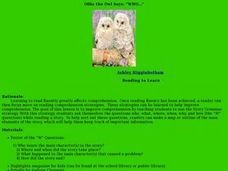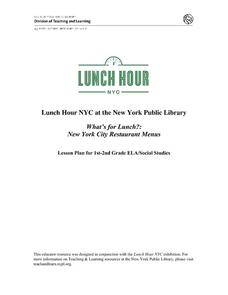Super Duper Publications
WH Question Cards - Pro: Who, What, When, Where, Why
Do you have kids on your caseload with wh questions goals, that need extra practice comprehending and asking who, what, when, where, and why questions? Then this clever app is designed for you!
Alabama Learning Exchange
Who, What, When, Where, Why, How?
Your youngsters are just starting to read texts and pull out important information. Use this graphic organizer with any text to help them practice identifying the who, what, when, where, why, and how of a text. Although the format of the...
Curated OER
It's Happening Where: Graphic Organizer #1 for Newspaper Articles
Planning a newspaper or journalism unit? Use these graphic organizer to help your young reporters organizer their articles. The first page instructs users to plan out the structure of their article, while the second page prompts them to...
Curated OER
Build Masters: Identifying Details
Find key details in books using this note card strategy. Each reader gets six cards with the classic who, what, where, when, why, and how detail prompts. After they read the book, they choose a card and locate a key detail answering the...
Curated OER
Question words, question marks
Practice the five W's and question marks with a fun grammar worksheet. After copying the words who, what, where, when, why, and how, kindergartners fill the words into various questions. For extra practice, have kids come up with their...
Curated OER
Creative Problem Solving: Using the 5 W's (Who, What, Where, When, Why)
Third graders assimilate the use of the 5 W's (Who, What, Where, When, Why) when solving problems that are presented in literature and in real life situations. They use common fairy tales to solve problems that might arise at home or...
Curated OER
Current Event: Investigate the Details....
In this investigating the details worksheet, young scholars read a current event and fill in the who, what, when, where and why parts of the worksheet. Students retell the story in their own words on the lines provided.
Curated OER
What's In a Name?
Students explore the relationship between names and certain cultures and locations. In this identity lesson, students create family migration or immigration maps. Students read excerpts from When My Name was Keoko and Lost Names: Scenes...
Curated OER
Who, What, Where, When, Why?
In this creating information questions and answers worksheet, students write who, what, where, when, and why questions write answers in complete sentences, and complete a dialogue. Students write 19 short sentences.
Curated OER
Ollie the Own Says: WHO
Scholars examine the strategy of making a story map or outline to identify the main elements of a story. They discuss the who, what, where, when, why, and how of a story, in an outline form. As a class they read a short story, answer the...
Curated OER
On the Dots
If you want your class to practice reading informational texts and answering related questions, this short exercise from The New York Times' "Learning Network" might be helpful. It includes an article on Dippin' Dots and uses...
Curated OER
I Know Why the Caged Bird Sings by Maya Angelou: Fun Trivia Quiz
This Fun Trivia interactive, online quiz may be engaging for readers who want to self-assess their basic understanding of Angelou's I Know Why the Caged Bird Sings; however, I do not recommend it as a class assignment given the lack of...
Curated OER
English - "What, Why, When, How, Where, Who?" - Framing Questions to Obtain Information
Young scholars explore interviewing skills. In this interviewing skills lesson plan, students frame questions to obtain informative answers as they use what, why, when, how, where, and who questions.
Curated OER
Where the Books Are
The news is full of interesting stories and ideas shared in an informational style. Readers use the provided who, what, when, where, and why questions as they explore an article about a man who is passionate about archiving physical...
Curated OER
Who is Mark Zuckerberg?: Reading Informational Text
This New York Times "Learning Network" exercise provides 10 questions that apply to an article about Mark Zuckerberg. It poses key journalistic questions like, who, what, why, where, how, and when. This resource provides a nice, short...
Curated OER
Star 5 W's
In this 5 W's worksheet, students identify key elements from a book they have read: who, what, where, why, when. Students write details in the five points of a star and illustrate the book in the center.
New York Public Library
What's for Lunch?: New York City Restaurant Menus
Do you remember the days when a cup of coffee cost five cents? At A.W. Dennett restaurant in 1894, you could buy a five-cent cup of coffee and as well as a five-cent slice of pie to accompany it. The menu from that year is a primary...
Curated OER
What Are You Going To Do? Answering Questions
In this writing worksheet, 2nd graders write the answers to 10 questions about what they are going to do. They who, what, where, why, and when questions.
Curated OER
Who is the Expert? Exploring Credible Sources in Healthcare
How do you decide what sources are credible when researching online? Evaluate sources with a focus on researching health issues. After brainstorming common health concerns and how they would try to diagnose these problems, class members...
Curated OER
Lesson 12: What Reasonable Conclusions are Possible?
Oftentimes, we jump to conclusions when we are given a limited amount of information. Take a look at reasonable conclusions with your communications studies class. If-clauses, dichotomous thinking, and assumptions are all covered with...
Student Handouts
The Five W's and How
Here is a great graphic organizer for ensuring that young researchers and writers cover all their bases when brainstorming a topic by considering the five W's (who, what, where, when, and why) and how.
Syracuse City School District
Summary of Fiction and Non-Fiction Text
Somebody Wanted But So Then (SWBST)? Yes! Here's a great strategy for teaching young readers how to summarize narrative text. In addition, the packet includes exercises that show kids how to summarize nonfiction text using the classic...
Curated OER
When Turtle Grew Feathers
Students explore the theme of friendship as it relates to the story When Turtle Grew Feathers. In this friendship lesson plan, students discuss friendship, answer comprehension questions, and create their own friendship story.
Nosapo
Family Titles, Pronouns, Writing about a Person
How is your grandmother related to you? How is your cousin related to your grandmother? Learn about family relationships and pronouns with an activity that guides pupils to write two short narratives about members of their families.

























